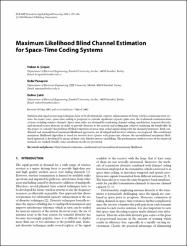| dc.contributor.author | Çırpan, Hakan Ali | en_US |
| dc.contributor.author | Panayırcı, Erdal | en_US |
| dc.contributor.author | Çekli, Erdinç | en_US |
| dc.date.accessioned | 2015-01-15T22:59:44Z | |
| dc.date.available | 2015-01-15T22:59:44Z | |
| dc.date.issued | 2002-05 | |
| dc.identifier.citation | Çırpan, H. A., Panayırcı, E. & Çekli, E. (2002). Maximum likelihood blind channel estimation for space-time coding systems. Eurasip Journal on Applied Signal Processing, 2002(5), 497-506. doi:10.1155/S1110865702000847 | en_US |
| dc.identifier.issn | 1110-8657 | |
| dc.identifier.issn | 1687-0433 | |
| dc.identifier.uri | https://hdl.handle.net/11729/113 | |
| dc.identifier.uri | http://dx.doi.org/10.1155/S1110865702000847 | |
| dc.description.abstract | Sophisticated signal processing techniques have to be developed for capacity enhancement of future wireless communication systems, In recent years, space-time coding is proposed to provide significant capacity gains over the traditional communication systems in fading wireless channels. Space-time codes are obtained by combining channel coding, modulation, transmit diversity, and optional receive diversity in order to provide diversity at the receiver and coding gain without sacrificing the bandwidth. In this paper, we consider the problem of blind estimation of space-time coded signals along with the channel parameters. Both conditional and unconditional maximum likelihood approaches are developed and iterative solutions are proposed. The conditional maximum likelihood algorithm is based on iterative least squares with projection whereas the unconditional maximum likelihood approach is developed by means of finite state Markov process modelling. The performance analysis issues of the proposed methods are studied. Finally, some simulation results are presented. | en_US |
| dc.language.iso | eng | en_US |
| dc.publisher | Hindawi Publishing Corporation | en_US |
| dc.relation.isversionof | 10.1155/S1110865702000847 | |
| dc.rights | info:eu-repo/semantics/openAccess | en_US |
| dc.subject | Blind channel estimation | en_US |
| dc.subject | Conditional and unconditional maximum likelihood | en_US |
| dc.subject | Codes | en_US |
| dc.subject | Algorithms | en_US |
| dc.subject | Blind source separation | en_US |
| dc.subject | Channel capacity | en_US |
| dc.subject | Communication channels (information theory) | en_US |
| dc.subject | Fading (radio) | en_US |
| dc.subject | Iterative methods | en_US |
| dc.subject | Least squares approximations | en_US |
| dc.subject | Markov processes | en_US |
| dc.subject | Maximum likelihood estimation | en_US |
| dc.subject | Signal encoding | en_US |
| dc.subject | Space time adaptive processing | en_US |
| dc.subject | Wireless telecommunication systems | en_US |
| dc.subject | Coding gain | en_US |
| dc.subject | Fading channels | en_US |
| dc.subject | Maximum likelihood algorithm | en_US |
| dc.subject | Space time codes | en_US |
| dc.subject | Space time coding | en_US |
| dc.subject | Transmit diversity | en_US |
| dc.subject | Signal filtering and prediction | en_US |
| dc.title | Maximum likelihood blind channel estimation for space-time coding systems | en_US |
| dc.type | article | en_US |
| dc.description.version | Publisher's Version | en_US |
| dc.relation.journal | EURASIP Journal on Advances in Signal Processing | en_US |
| dc.contributor.department | Işık Üniversitesi, Mühendislik Fakültesi, Elektrik-Elektronik Mühendisliği Bölümü | en_US |
| dc.contributor.department | Işık University, Faculty of Engineering, Department of Electrical-Electronics Engineering | en_US |
| dc.contributor.authorID | 0000-0001-7328-6626 | |
| dc.identifier.volume | 2002 | |
| dc.identifier.issue | 5 | |
| dc.identifier.startpage | 497 | |
| dc.identifier.endpage | 506 | |
| dc.peerreviewed | Yes | en_US |
| dc.publicationstatus | Published | en_US |
| dc.relation.publicationcategory | Makale - Uluslararası Hakemli Dergi - Kurum Öğretim Elemanı | en_US |
| dc.contributor.institutionauthor | Panayırcı, Erdal | en_US |
| dc.relation.index | WOS | en_US |
| dc.relation.index | Scopus | en_US |
| dc.relation.index | Science Citation Index Expanded (SCI-EXPANDED) | en_US |
| dc.description.quality | Q3 | |
| dc.description.wosid | WOS:000176893300007 | |


















